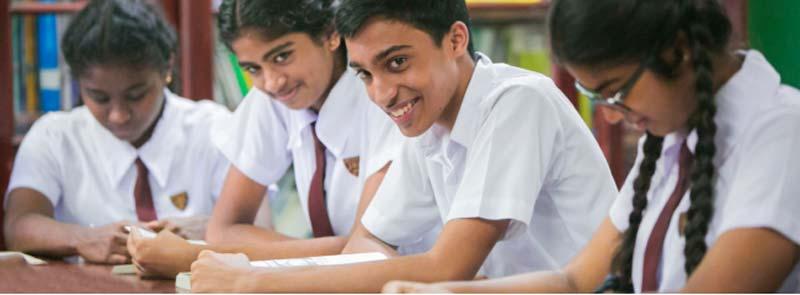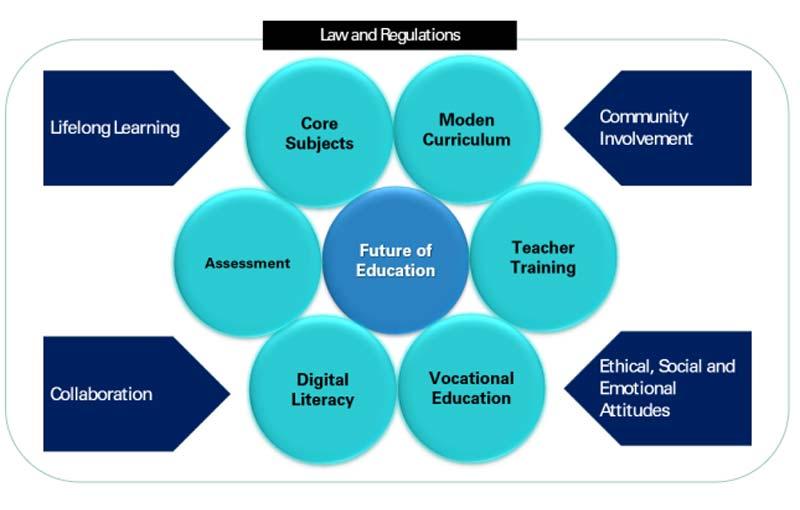Reply To:
Name - Reply Comment

(Photo Credit: Ministry of Education)
The current period is marked by significant challenges in various fields, with education being one of the main areas facing these challenges. Education is crucial for a country's outlook and building a prosperous future generation is the foundation for sustainable development. “Education is the most powerful weapon which you can use to change the world”, Nelson Mandela, former President of South Africa, emphasized the importance of education. Despite Sri Lanka's high literacy rate of approximately 99%, concerns persist about the quality of its education system.
The education system in Sri Lanka has evolved over several eras, with the free education system starting in 1945 facilitating rapid changes after gaining independence from British colonial rule. A study by post-graduate students of the Master of Sociology Degree from the University of Sri Jayewardenepura, guided by Professor Rasanjali Perera, focuses on identifying challenges and reforms in Sri Lanka's education system. The study, rooted in the subject of Educational Sociology, involves 88 teachers and employs empirical methods. It aims to propose sustainable development changes in the coming decade, despite past changes.
The Identified Challenges are as follows.
Lack of fair and adequate access to quality education
Outdated curriculum
Traditional teaching method
Limited access to digital learning resources
Lack of continuous training and professional development for teachers.
Inadequate and unequal distribution of infrastructure.
Increasing tendency of school dropouts.
Educational methodology dependent on cultural factors
Low inclination towards practical skills
Weaknesses in the evaluation system
Administrative issues
The role assigned was to offer sustainable solutions to the identified issues, with the aim of proposing an education system capable of adapting to global trends, fostering innovation, and contributing to the sustainable development of the nation. Opportunities for every Sri Lankan to reach their full potential were sought to be provided. Suggestions for bringing about a qualitative change in the education sector were made through the provision of sustainable solutions to the previously identified problems.
Fair Accessibility for All
At a time when education is said to be not a privilege but a basic human right, some suggestions to create fair access to quality education include providing additional resources and support to underprivileged schools, enlisting qualified teachers to reduce student-teacher ratios, create support systems for students with disabilities or special needs, to establish a centralized digital library system due to the scarcity of printed textbooks, as well as to develop transportation facilities to enable children in difficult regions to access their education.
Up to Date Curriculum and Student-Centered Learning Methodology
The need for a curriculum that is compatible with today's globalized world has been a requirement of the Sri Lankan education system for a long time and for that, revising the curriculum to align with the current and future industry needs, promoting student-centered learning and discouraging the tendency to memorize, development of practical activities for all subjects, introduction of technology-based learning methods for interactive learning, introduction of a learning environment nurtured through critical thinking and problem-solving skills across all levels have been presented here.
Digital Empowerment
The digitization of Sri Lankan education is seen to be behind in this age of widespread digitization, in which the world resembles a global village. Technology integration into the educational system is seen as a process that demands a quick response. It is important to work with organizations that offer internet services to improve internet access. In addition to providing teachers with technical training, it is also thought to be vital to replace printed textbooks with digital ones. Additionally, steps should be taken to avoid inappropriate internet use.
Empowering Teacher Training
The importance of the teacher's role in teaching the modern curriculum is not insignificant. John Dewey has said that if we teach today's child what we learned yesterday that child's future will be miserable, explaining the need for the teacher's knowledge to be continuously updated. Therefore, the proposals presented here are to prepare a continuous professional development framework for teachers, train teachers on modern teaching methods, implement counselling programs to guide teachers, create a centralized platform to share teachers' experiences and abilities.
Keeping Students Engaged in Education
Along with the current economic situation, it was observed that, an increase in the number of students dropping out of school. The teachers who were surveyed about this said that due to the economic difficulties of the families, a large number of children in rural as well as urban areas stop their school journey midway. In order to provide solutions for that, implementing counselling programs to give a clear understanding to children and parents about the value of education, increasing extracurricular activities in the school, developing teacher-parent relationship, implementing a bursary system for children from low-income families through a proper method, providing loan facilities at low interest rates, can be done. Apart from this, it is stated in this proposal that by strengthening the rules and regulations regarding child labour, the tendency of many children to stop schooling and enter jobs can be reduced.
Educational Infrastructure Development
As a developing country, there is a disparity in the distribution of resources in Sri Lanka. Often the lack of infrastructure is a barrier to creating a quality learning environment. Therefore, infrastructure development in the education sector is an integral part of the journey towards a sustainable future. In particular, it has been proposed to modernize laboratory facilities, library facilities, condition of classrooms, sanitary facilities etc. as soon as possible. And by involving the private sector in carrying out these projects, this process can be done efficiently.
An Education not Regulated by Culture
In Sri Lanka, certain cultural influences are still seen in the field of education. The problem of giving sex education, which is widely discussed in today's society, is one of the results of connecting education with this culture. Many people are reluctant to implement western methods in this country. Therefore, according to some method, action should be taken to bring Western education methods to Sri Lanka. It is also suggested to increase the mixed school system. And not based on religious and cultural factors, attention has been focused on looking at education through rationality and scientific methodology.
Development of Practical Skills and Vocational Education
It has been seen for a long time that education in Sri Lanka does not directly contribute to development. It is a clear fact that the reason for this is the decline in the tendency to provide vocational education. The proposal to establish more institutions to provide professional and industrial training that can contribute to the development of the country has been mainly presented here. Apart from this, an action plan needs to be created to bring that knowledge into Sri Lanka by contacting the developed countries of the world and making agreements with them. In today's Sri Lanka, there is a need for an education system that highlights practical skills from an early age. Also, by establishing a dual education system in this country like the one that is in operation in Germany, more inclination towards vocational education can be created.
A Diverse Evaluation Methodology and Systematic Follow-Up
In an education system that maintains a written examination system, there is a greater tendency to put the student in a rote learning mindset. In Sri Lanka there is a failed practice of assessing the knowledge they have acquired only through a written test of several hours. Therefore, these proposals emphasize the need for a multifaceted evaluation system that prioritizes practical evaluations. Also, by conducting unannounced assessments, an idea can be obtained about the extent to which the student has mastered the subject. In addition, it is suggested to establish an evaluation system that works for teachers as well.
Streamlining the Administrative and Coordination Process
Administrative problems that have arisen in the education process in Sri Lanka have been seen for a long time. This has been due to lack of coordination between institutions. The creation of a centralized body responsible for monitoring and coordination will play an important role in finding solutions to this problem. It is also extremely important to continuously review and update educational policies to adapt to changing needs.
Transformative Education Model for Future Sri Lanka
The new education model proposed to be created for the sustainable development of Sri Lanka through the above suggestions is given below. Accordingly, Sri Lanka, which has been considered a developing country for many years,
has a great role to play in making it a developed country. Within the legal framework surrounding the above model, the work of reducing corruption and disparities in education should be done. There, the need to formulate new laws to prevent brain drain, which has become a big social problem at present, will also be a unique milestone in the journey towards a sustainable future. Providing quick solutions to these challenges will undoubtedly open the door to creating a prosperous future generation through sustainable education.

Figure 1: Transformative Education Model for Future Sri Lanka
Ruwan Bolongho
Department of Sociology
Faculty of Graduate Studies
University of Sri Jayewardenepura